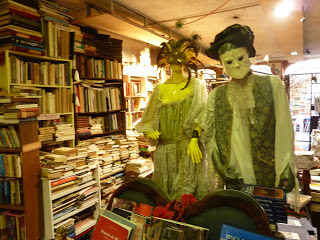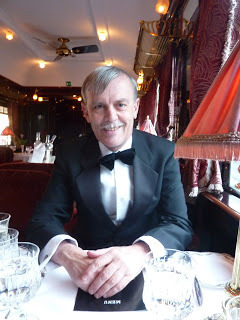Martin Edwards's Blog, page 225
May 1, 2013
Windermere and Wray

 The Crime Writers' Association held its annual conference for members at the Belsfield Hotel, overlooking Windermere, last week-end. Brilliantly organised by Diane Janes, it ranks as one of the best I've ever attended, and I've been to most of the CWA conferences that have been held in the past twenty-five years. There was a definite feelgood factor about the whole experience. The conference is open to members and their guests, rather than the general reading public, as with Crimefest. If you are eligible to join the CWA, whether or not based in Britain, and whether as a writer or associate member, then I do hope you'll consider it. Apart from the conference, the CWA offers many benefits, and that helps to explain why membership numbers are rising sharply - something that is, I think, very good news.
The Crime Writers' Association held its annual conference for members at the Belsfield Hotel, overlooking Windermere, last week-end. Brilliantly organised by Diane Janes, it ranks as one of the best I've ever attended, and I've been to most of the CWA conferences that have been held in the past twenty-five years. There was a definite feelgood factor about the whole experience. The conference is open to members and their guests, rather than the general reading public, as with Crimefest. If you are eligible to join the CWA, whether or not based in Britain, and whether as a writer or associate member, then I do hope you'll consider it. Apart from the conference, the CWA offers many benefits, and that helps to explain why membership numbers are rising sharply - something that is, I think, very good news.We began on Friday afternoon with a boat trip on the lake, which was great fun. Three speakers were lined up for Saturday morning, and in fact I was the first of them, with a talk on Golden Age detective fiction. I wasn't quite sure how a group of 21st century writers would react to this particular subject, but the feedback was very positive - a big relief, to put it mildly. It is much harder in my experience to give a talk to friends and colleagues rather than a group of strangers, because you really don't want to feel you have disappointed people you know and like. Sometimes this kind of anxiety, needless or otherwise, can mean that the talk goes less well as a result. But anyway, I was glad to hand over to those who came after me, and over the week-end as a whole we had some stand-out talks, including two by former senior police officers.
There were various organised events scheduled for Saturday afternoon, but I was keen to do some research of locations for my next Lakes book, and fulfilled a long-held ambition by visiting Wray Castle, a 19th century Gothic folly which has long been owned by the National Trust, but only recently opened to the general public. The setting is fantastic, overlooking Windermere, and since the weather was excellent there was a chance to walk around Wray Bay, a peaceful and lovely part of the area that I'd never encountered before.
The Saturday evening banquet was as enjoyable as it always is, and I was on a table with Peter James and Felix Francis, two best-sellers - but, and this is the great thing about the CWA in my experience, there is no differentiation between best-sellers, mid-listers, and those who are not currently published. The companionship that you always find at CWA events - again, I'm speaking personally, but I know many others agree - is the great strength of the organisation. I'm on the committee now, and the new chair is Alison Joseph. Under her leadership, I'm confident that, even in testing times for authors, the CWA will continue to flourish.



Published on May 01, 2013 04:45
April 30, 2013
The Most Beautiful Bookshop in the World





"The Most Beautiful Bookshop in the World" is the claim made by Libreria Acqua Alta in the Castello district of Venice, and the proud boast might just be true. One of the joys of Venice is that, when walking through the labyrinth of passageways, you never quite know what you will find, and I came across this bookshop quite by chance when roaming through the city the day before my Orient Express trip.
The entrance may not seem anything special, but once inside, the atmosphere is terrific, and not really like that of any other bookshop I've visited - and believe me, I've visited plenty!. Books are crammed all over the place, and the decor is idiosyncratic and charming. At the back of the shop is a small courtyard which commands a lovely view of a canal - if you climb a staircase made of books, that is...
Not surprisingly, the shop holds a large stock of mysteries by Donna Leon, whose books set in Venice gain from the close knowledge of the city that she has gained through living there. I've read a few of her books, and this trip made me want to return to them. I've never met her, but if I did, I'd want to ask her about the nature of living in Venice when one is not a local. For an author, living in Venice must be quite an extraordinary experience, and I imagine that many writers who have visited the city have been inspired to write stories set there.
I vividly remember the two incidents on a trip to Venice a few years ago that prompted me to writer "The Bookbinder's Apprentice". The first was when I came across a bookbinder's shop, quite by chance. The other was when I spent an hour or so in a tranquil square, mapping out the story in my mind. It's a story that's been very lucky for me, and one more reason why I'm so fond of Venice..
Published on April 30, 2013 04:00
April 29, 2013
On the Orient Express




Last Wednesday morning, I embarked on one of those trips of a lifetime, travelling on the Orient Express from Venice, arriving back in London on Thursday evening. This was a long-held ambition, inspired originally of course by the classic Christie novel, and given fresh impetus by a work colleague who did the trip a while back and recommended it to me.
There was no murder on the Orient Express last week, I'm glad to say (though some emergency stops early in the trip did make me wonder if something strange was going on - "Italian drivers!" laughed one of the waiters as he did a bit of unintended juggling with the plates.) But the train lived up to its reputation for luxury and atmosphere, and the timing and route of this particular journey made it possible to enjoy some varied and wonderful scenery, above all in Switzerland.
In preparing for the trip, I'd read The 8.55 to Baghdad, by Andrew Eames, which traces Christie's first trip to Ur, and includes a section on the Orient Express. It's a very good book, and Eames clearly had great admiration for Christie's fortitude in making such a long journey on her own, especially as, once she left the great train, things got rather more challenging for her as she made her way to the dig run by Leonard Woolley, whose weird wife was later turned by Christie into a character in Murder in Mesopotamia.
The train ran as far as Calais, and after getting through the Channel Tunnel, the last leg of our journey was by British Pullman. Again, very swish with lots of food and drink. I've seldom experienced this kind of luxury living, and although it was for less than forty-eight hours from start to finish, it was truly memorable.




The stay in Venice beforehand was also brief, but it's a city I could never tire of, and tomorrow my post will focus on a truly extraordinary book "experience" during my visit- nothing to do with my Venetian story "The Bookbinder's Apprentice", mind you!
Published on April 29, 2013 03:30
April 28, 2013
Broadchurch: the final episode (no spoilers)
Broadchurch hooked me right from the early minutes of episode one, and as I've been away for a few days, I've only just caught up with the finale, which aired on Monday evening. Luckily, I've managed to avoid reviews of the final episode, so my enjoyment wasn't in any way spoiled. And I did enjoy the final episode, just as much as I've enjoyed all the others.
It's interesting to reflect on why this series has been such a huge success - and it has been so successful that it's scarcely an exaggeration to say that Broadchurch gripped the nation. The acting of David Tennant, Olivia Colman and the other key members of the cast was excellent, and Colman in particular was superb in the final episode. A hugely talented performer. The setting, on Dorset's Jurassic coast, was beautiful and atmospheric, and that certainly helped. But the greatest credit must go to Chris Chibnall, who devised and wrote the series. I would agree with those who have pointed out that there were some aspects of the story which tested one's suspension of disbelief. For me, the lack of forewarning about the culprit's fatal personality flaw was the most questionable part of the story. But never mind the quibbles. This was a superbly entertaining piece of television drama.
Some critics have felt that the marriage of a portrait of a community torn apart by grief and suspicion with a classic whodunit boasting a wide range of suspects whose secrets were gradually uncovered, was an uneasy one. I don't agree. The nature of crime fiction is that, however hard one strives for realism, there is bound to be a gap between the story and what actually happens in the real world. But despite this, it's perfectly reasonable to strive for realism, and Chibnall did a really fine job in capturing the devastating effect of murder on people's lives.
Broadchurch has shown that whodunits have an enduring appeal - provided, of course, that they are well done. We're told that "Broadchurch will return", but Chibnall will need to do remarkably well to top this series. It will be fun to see whether he can manage it. Waiting to find out will be almost as tense as waiting to find out who did kill Danny Latimer.
It's interesting to reflect on why this series has been such a huge success - and it has been so successful that it's scarcely an exaggeration to say that Broadchurch gripped the nation. The acting of David Tennant, Olivia Colman and the other key members of the cast was excellent, and Colman in particular was superb in the final episode. A hugely talented performer. The setting, on Dorset's Jurassic coast, was beautiful and atmospheric, and that certainly helped. But the greatest credit must go to Chris Chibnall, who devised and wrote the series. I would agree with those who have pointed out that there were some aspects of the story which tested one's suspension of disbelief. For me, the lack of forewarning about the culprit's fatal personality flaw was the most questionable part of the story. But never mind the quibbles. This was a superbly entertaining piece of television drama.
Some critics have felt that the marriage of a portrait of a community torn apart by grief and suspicion with a classic whodunit boasting a wide range of suspects whose secrets were gradually uncovered, was an uneasy one. I don't agree. The nature of crime fiction is that, however hard one strives for realism, there is bound to be a gap between the story and what actually happens in the real world. But despite this, it's perfectly reasonable to strive for realism, and Chibnall did a really fine job in capturing the devastating effect of murder on people's lives.
Broadchurch has shown that whodunits have an enduring appeal - provided, of course, that they are well done. We're told that "Broadchurch will return", but Chibnall will need to do remarkably well to top this series. It will be fun to see whether he can manage it. Waiting to find out will be almost as tense as waiting to find out who did kill Danny Latimer.
Published on April 28, 2013 14:14
April 26, 2013
Forgotten Book: Garstons
H.C. Bailey's reputation as a crime writer, once very high, has long been in eclipse. There are reasons for this, mostly to do with his idiosyncratic style of telling a story, which has long been out of fashion, and seems to me to be very unlikely to come back into vogue in the foreseeable future. Yet he remains an interesting and unusual writer, and Garstons, my Forgotten Book for today, which dates from 1930, is an interesting and unusual book.
The protagonist of this book - it would be too much of a stretch to describe him as a "hero" - is Joshua Clunk. He is a solicitor, but not like any other fictional (or real life) solicitor I've come across. True, he acts for some very dodgy people, and likes to get involved in sorting out mysteries, and in those respects he resembles my own Harry Devlin. But he's a strange chap, given to singing hymns and taunting the police in a rather patronising way. He's happily married, but there are hints at a dark and unscrupulous side to his character, and his secretive and provocative manner rubs people up the wrong way. Yet he gets results. A man to be reckoned with, and Bailey continued to write about him for the rest of his career after introducing him in this story.
Garstons opens with a young man whose family is known to Clunk suggesting that his father was murdered by the owners of a company called Garstons for the sake of a valuable invention. What follows is a story that meanders, quite eccentrically at times, but takes in further crimes, including murder and blackmail. Clunk takes a close interest in goings-on at the home of Lord Croyland, owner of the Garston company, and evidently a man with something to hide, before guiding the police to the solution of a long-concealed mystery.
There are some good ideas here. The concept of an anti-hero like Clunk is a good one, though the choice of his name strikes me as unfortunate, as it suggests a feeble humour that isn't really what Bailey was about. Perhaps it seemed like a good idea back in 1930, but I rather think that Bailey's problem was that he made some poor choices about how to execute the very good ideas for crime stories that he kept coming up with. Frustrating, but there are rewards in reading Bailey, provided you are willing to make plenty of allowances. For me, he is an acquired taste, but after years of reservations about his work, I have now acquired that taste - at least in small doses!
The protagonist of this book - it would be too much of a stretch to describe him as a "hero" - is Joshua Clunk. He is a solicitor, but not like any other fictional (or real life) solicitor I've come across. True, he acts for some very dodgy people, and likes to get involved in sorting out mysteries, and in those respects he resembles my own Harry Devlin. But he's a strange chap, given to singing hymns and taunting the police in a rather patronising way. He's happily married, but there are hints at a dark and unscrupulous side to his character, and his secretive and provocative manner rubs people up the wrong way. Yet he gets results. A man to be reckoned with, and Bailey continued to write about him for the rest of his career after introducing him in this story.
Garstons opens with a young man whose family is known to Clunk suggesting that his father was murdered by the owners of a company called Garstons for the sake of a valuable invention. What follows is a story that meanders, quite eccentrically at times, but takes in further crimes, including murder and blackmail. Clunk takes a close interest in goings-on at the home of Lord Croyland, owner of the Garston company, and evidently a man with something to hide, before guiding the police to the solution of a long-concealed mystery.
There are some good ideas here. The concept of an anti-hero like Clunk is a good one, though the choice of his name strikes me as unfortunate, as it suggests a feeble humour that isn't really what Bailey was about. Perhaps it seemed like a good idea back in 1930, but I rather think that Bailey's problem was that he made some poor choices about how to execute the very good ideas for crime stories that he kept coming up with. Frustrating, but there are rewards in reading Bailey, provided you are willing to make plenty of allowances. For me, he is an acquired taste, but after years of reservations about his work, I have now acquired that taste - at least in small doses!
Published on April 26, 2013 03:55
April 24, 2013
The Tooth Tattoo by Peter Lovesey
The Tooth Tattoo is the latest book set in Bath and featuring the likeable if sometimes curmudgeonly Peter Diamond. The gruff cop shares his first name with his creator, Peter Lovesey., Regular readers of this blog will know how much I relish Peter's books. I first came across them when he was writing about the Victorian cop Sergeant Cribb and I've read every novel he's ever written, as well as the vast majority of his short stories. As well as reading his books, I collect them, and I finally got my hands on a dust jacketed first edition of his debut novel recently. You could say I'm a fan.
Is his latest, published by Little, Brown up to standard? Absolutely. In fact, one of its strengths is the way you can never be sure where the story is heading. It's a twisty tale, full of unexpected developments. I was also surprised to discover that music is at the heart of the book, as Peter does not normally feature music very heavily in his fiction. But here there is a great deal about classical music and string quartets, and the unusual nature of the relationships between members of a quartet.
The strange deaths of two young Japanese women, one in Vienna, one in Bath, seem to be connected. The corpse found in a Bath canal had a musical note tattooed on one of her teeth. Apparently this is a popular, if to my mind weird, custom in Japan. Diamond's investigations run alongside a series of chapters focusing on a violist called Mel, who may or may not have something to hide.
I really enjoyed this one. Mind you, it was just as well, as I'd already agreed to interview Peter for that terrific US magazine Mystery Scene. As always, he was graciousness itself when answering my questions, and I like to think that there will be some things in the interview that even diehard Lovesey fans won't have come across before. The magazine in question, incidentally, will be in the book bags of all delegates to Bouchercon in the autumn. I would like to be there in New York myself, as Bouchercon is a lot of fun, but at present it doesn't seem likely. Next year, perhaps!
Is his latest, published by Little, Brown up to standard? Absolutely. In fact, one of its strengths is the way you can never be sure where the story is heading. It's a twisty tale, full of unexpected developments. I was also surprised to discover that music is at the heart of the book, as Peter does not normally feature music very heavily in his fiction. But here there is a great deal about classical music and string quartets, and the unusual nature of the relationships between members of a quartet.
The strange deaths of two young Japanese women, one in Vienna, one in Bath, seem to be connected. The corpse found in a Bath canal had a musical note tattooed on one of her teeth. Apparently this is a popular, if to my mind weird, custom in Japan. Diamond's investigations run alongside a series of chapters focusing on a violist called Mel, who may or may not have something to hide.
I really enjoyed this one. Mind you, it was just as well, as I'd already agreed to interview Peter for that terrific US magazine Mystery Scene. As always, he was graciousness itself when answering my questions, and I like to think that there will be some things in the interview that even diehard Lovesey fans won't have come across before. The magazine in question, incidentally, will be in the book bags of all delegates to Bouchercon in the autumn. I would like to be there in New York myself, as Bouchercon is a lot of fun, but at present it doesn't seem likely. Next year, perhaps!
Published on April 24, 2013 10:44
April 21, 2013
Endeavour, Broadchurch, and does murder go on forever?
Endeavour continued this evening with another episode from the reliable Russell Lewis. A special feature of Fugue was the inclusion in the cast of Abigail Thaw in a small part as a journalist, a nice touch, given the many memorable performances of her father John in Inspector Morse Another enjoyable Oxford whodunit, the plot a serial killer story with a bundle of classic, and indeed classical music, ingredients. I gather that the first episode had very good ratings, and they were well deserved.
Then, tomorrow evening, comes the final episode of Broadchurch. I'm away, so it may be a few days before I catch up with whodunit. However, just before I set off, I'm scheduled to do an interview on Radio Cumbria's breakfast show, to discuss not only Broadchurch but also, more generally, the eternal appeal of the whodunit.
I touched on this very subject on this blog last week, and for all the changes in society and styles of writing, I see no end in sight for the whodunit. Millions of people still enjoy the form, and I'm tempted to say that it's as popular as it's ever been. This would not have surprised Agatha Christie, even though, as a modest woman, it's clear that she didn't expect her own books to last (why else would she, in some of them, have given away the solutions to earlier puzzles?)
I have in my collection a book that Christie signed for a friend of hers at the height of the Second World War. It must have been a very frightening time. Yet, as she said in her inscription, "Wars may come and wars may go, but murder goes on for ever!" It's true in real life, sadly, but much more happily, I think it's also true of fiction. The whodunit mystery has real staying power, and the number of TV whodunits I've reviewed since New Year's Day rather bears that out.
By the way, I'm still not quite sure about Arne Dahl. I watched the new story, Bad Blood, last night, but I rather feel the writers are struggling for effect, unlike Russell Lewis.
Finally, my trip has a detective fiction connection, of which more in a few days. Meanwhile, a review of Peter Lovesey's new book will appear while I'm away from home.
Then, tomorrow evening, comes the final episode of Broadchurch. I'm away, so it may be a few days before I catch up with whodunit. However, just before I set off, I'm scheduled to do an interview on Radio Cumbria's breakfast show, to discuss not only Broadchurch but also, more generally, the eternal appeal of the whodunit.
I touched on this very subject on this blog last week, and for all the changes in society and styles of writing, I see no end in sight for the whodunit. Millions of people still enjoy the form, and I'm tempted to say that it's as popular as it's ever been. This would not have surprised Agatha Christie, even though, as a modest woman, it's clear that she didn't expect her own books to last (why else would she, in some of them, have given away the solutions to earlier puzzles?)
I have in my collection a book that Christie signed for a friend of hers at the height of the Second World War. It must have been a very frightening time. Yet, as she said in her inscription, "Wars may come and wars may go, but murder goes on for ever!" It's true in real life, sadly, but much more happily, I think it's also true of fiction. The whodunit mystery has real staying power, and the number of TV whodunits I've reviewed since New Year's Day rather bears that out.
By the way, I'm still not quite sure about Arne Dahl. I watched the new story, Bad Blood, last night, but I rather feel the writers are struggling for effect, unlike Russell Lewis.
Finally, my trip has a detective fiction connection, of which more in a few days. Meanwhile, a review of Peter Lovesey's new book will appear while I'm away from home.
Published on April 21, 2013 14:16
April 19, 2013
Forgotten Book - Antidote to Venom
I've gradually become more interested in the work of Golden Age stalwart Freeman Wills Crofts. Despite his sometimes laborious style, he was a thoughtful man who experimented with the detective story form rather more than I had realised. My Forgotten Book for today, Antidote to Venom, is a case in point. First published in 1938, it includes a short preface in which Crofts makes it clear that he was trying was a twofold experiment.
First, he combines an "inverted" crime story with a conventional account of police detection. This is a bold step, structurally, but very interesting. George Surridge is the protagonist of the first part of the book. He is in charge of a zoo at "Birmington" in the Midlands, good at his job, but unhappily married to a snooty woman and fonder of gambling than his finances should permit.
Things start to go wrong when he falls for a woman called Nancy. He contemplates murdering an aunt for her money, but shrinks from the act. However, when the old lady dies, and he finds that her solicitor has been robbing her of all her assets, he gets sucked into a complicated and ingenious criminal conspiracy. I thought this part of the story was extremely well done. After murder is committed, it seems that the crime will go unpunished, but once Inspector French comes on the scene, the criminals' fate is, of course, sealed.
The second part of the experiment is that Crofts was trying to tell what he called a "positive" story. What he meant by this was that he was conveying a positive religious message about the redemption of a sinner. This aspect of the experiment is less successful, mainly because Crofts was not especially good at creating truly believable characters acting in a consistent and wholly believable way. Even so, I thought that what he did in the book was brave, unusual, and absolutely readable. I've read a number of his books now, but I'd rate this as the most impressive so far. Definitely worth seeking out.
First, he combines an "inverted" crime story with a conventional account of police detection. This is a bold step, structurally, but very interesting. George Surridge is the protagonist of the first part of the book. He is in charge of a zoo at "Birmington" in the Midlands, good at his job, but unhappily married to a snooty woman and fonder of gambling than his finances should permit.
Things start to go wrong when he falls for a woman called Nancy. He contemplates murdering an aunt for her money, but shrinks from the act. However, when the old lady dies, and he finds that her solicitor has been robbing her of all her assets, he gets sucked into a complicated and ingenious criminal conspiracy. I thought this part of the story was extremely well done. After murder is committed, it seems that the crime will go unpunished, but once Inspector French comes on the scene, the criminals' fate is, of course, sealed.
The second part of the experiment is that Crofts was trying to tell what he called a "positive" story. What he meant by this was that he was conveying a positive religious message about the redemption of a sinner. This aspect of the experiment is less successful, mainly because Crofts was not especially good at creating truly believable characters acting in a consistent and wholly believable way. Even so, I thought that what he did in the book was brave, unusual, and absolutely readable. I've read a number of his books now, but I'd rate this as the most impressive so far. Definitely worth seeking out.
Published on April 19, 2013 03:55
April 17, 2013
Endeavour: Girl - ITV review
If Broadchurch has, as I said in my last post, underlined the continuing appeal of the whodunit, then Endeavour does not only that but also highlights the seemingly endless potential of Inspector Morse spin-offs. I enjoyed the pilot episode when it was screened, and the first episode of the first full series, Girl, was a high quality murder mystery.
A great deal of credit has to go to Russell Lewis, the writer, who has taken the essence of the original series,and the character as played by John Thaw, and given us a very appealing prequel set in the sixties. The plot of Girl was clever and the revelation of the culprit's identity took me completely by surprise. Pleasurable surprise, I must add. As I said yesterday, it is good to be fooled fairly, and I thought Russell Lewis paced the plot twists perfectly. There was even a neat little code which provided a crucial clue to that person's name. Colin Dexter would have been well pleased, I think.
The acting, too, is very good. Shaun Evans catches the young Morse's bolshie but vulnerable personality, and Roger Allam, as DI Thursday, is humane and believable. Some comic relief is offered by Anton Lesser's prissy disdain for the young cop. Sophie Stuckey, playng a suspect with epilepsy whom Morse fancies, handled the tricky role of the girl of the title very well.
Setting counts for a great deal in so many TV crime shows,and of course the Morse franchise has the inestimable advantage of being set in one of the most photogenic of cities. I wonder sometimes if people who are less keen on Oxford than I am may get bored with the endless flow of cop shows set there, but all the signs are that demand for those shows is as strong as ever. Yes, the broadcasters are playing it safe, and that's why a less conventional series like Broadchurch is so welcome. But if subsequent screenplays are as sharp as this one was, there is a good chance that Endeavour will run and run.
A great deal of credit has to go to Russell Lewis, the writer, who has taken the essence of the original series,and the character as played by John Thaw, and given us a very appealing prequel set in the sixties. The plot of Girl was clever and the revelation of the culprit's identity took me completely by surprise. Pleasurable surprise, I must add. As I said yesterday, it is good to be fooled fairly, and I thought Russell Lewis paced the plot twists perfectly. There was even a neat little code which provided a crucial clue to that person's name. Colin Dexter would have been well pleased, I think.
The acting, too, is very good. Shaun Evans catches the young Morse's bolshie but vulnerable personality, and Roger Allam, as DI Thursday, is humane and believable. Some comic relief is offered by Anton Lesser's prissy disdain for the young cop. Sophie Stuckey, playng a suspect with epilepsy whom Morse fancies, handled the tricky role of the girl of the title very well.
Setting counts for a great deal in so many TV crime shows,and of course the Morse franchise has the inestimable advantage of being set in one of the most photogenic of cities. I wonder sometimes if people who are less keen on Oxford than I am may get bored with the endless flow of cop shows set there, but all the signs are that demand for those shows is as strong as ever. Yes, the broadcasters are playing it safe, and that's why a less conventional series like Broadchurch is so welcome. But if subsequent screenplays are as sharp as this one was, there is a good chance that Endeavour will run and run.
Published on April 17, 2013 03:24
April 16, 2013
Broadchurch and the lure of whodunit
Broadchurch had its seventh and penultimate episode, and the question of who killed Danny continues to spark a great deal of debate. I've really enjoyed this series, which has provided a terrific reminder of the appeal - I'm tempted to say, the eternal appeal - of a really good whodunit. I was impressed by the
Most of us like to try solving a puzzle. I'm struck by the fact that my murder mystery events, which are interactive, almost always attract much larger audiences than conventional talks, and I'm also struck by the fact that people who come along tell me that the fun of trying to solve the mystery is at least as enjoyable as actually getting it right. That's a view I share. When I was reading Agatha Christie for the first time, I enjoyed the books where she fooled me even more than those where she didn't. As long as the fooling was 'fair'.
But the best detective stories offer added value along with the puzzle, in my opinion, which is where I part company with strict traditionalists like the late great Jacques Barzun. And this explains why Broadchurch scores so highly. The acting and the production values are excellent, but there is also a convincing portrait of a community torn by grief but also contaminated by suspicion. Yes, there are some implausibilities, but show me the whodunit where that isn't the case. There aren't many that are 100% credible; it's almost unavoidable, to rely on coincidence and unlikely developments, given the nature of the form. (Though I think it would be possible to write a whodunit that was totally credible in all respects. I'd be interested in any opinions about books already published which fit that description.)
There seems to be quite a widespread and growing consensus on the internet about the surprise twist regarding the identity of the killer. I'm not sure I go along with it, but I'll be fascinated to find the answer, and like everyone else, I hope it lives up to the expectations generated by this excellent series.
Most of us like to try solving a puzzle. I'm struck by the fact that my murder mystery events, which are interactive, almost always attract much larger audiences than conventional talks, and I'm also struck by the fact that people who come along tell me that the fun of trying to solve the mystery is at least as enjoyable as actually getting it right. That's a view I share. When I was reading Agatha Christie for the first time, I enjoyed the books where she fooled me even more than those where she didn't. As long as the fooling was 'fair'.
But the best detective stories offer added value along with the puzzle, in my opinion, which is where I part company with strict traditionalists like the late great Jacques Barzun. And this explains why Broadchurch scores so highly. The acting and the production values are excellent, but there is also a convincing portrait of a community torn by grief but also contaminated by suspicion. Yes, there are some implausibilities, but show me the whodunit where that isn't the case. There aren't many that are 100% credible; it's almost unavoidable, to rely on coincidence and unlikely developments, given the nature of the form. (Though I think it would be possible to write a whodunit that was totally credible in all respects. I'd be interested in any opinions about books already published which fit that description.)
There seems to be quite a widespread and growing consensus on the internet about the surprise twist regarding the identity of the killer. I'm not sure I go along with it, but I'll be fascinated to find the answer, and like everyone else, I hope it lives up to the expectations generated by this excellent series.
Published on April 16, 2013 03:15



